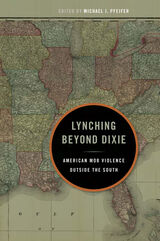3 books by Waldrep, Christopher

Lynching Beyond Dixie
American Mob Violence Outside the South
Edited by Michael J. Pfeifer
University of Illinois Press, 2013
In recent decades, scholars have explored much of the history of mob violence in the American South, especially in the years after Reconstruction. However, the lynching violence that occurred in American regions outside the South, where hundreds of persons, including Hispanics, whites, African Americans, Native Americans, and Asian Americans died at the hands of lynch mobs, has received less attention. This collection of essays by prominent and rising scholars fills this gap by illuminating the factors that distinguished lynching in the West, the Midwest, and the Mid-Atlantic. The volume adds to a more comprehensive history of American lynching and will be of interest to all readers interested in the history of violence across the varied regions of the United States.
Contributors are Jack S. Blocker Jr., Brent M. S. Campney, William D. Carrigan, Sundiata Keita Cha-Jua, Dennis B. Downey, Larry R. Gerlach, Kimberley Mangun, Helen McLure, Michael J. Pfeifer, Christopher Waldrep, Clive Webb, and Dena Lynn Winslow.
[more]

Night Riders
Defending Community in the Black Patch, 1890–1915
Christopher Waldrep
Duke University Press, 1993
In the late nineteenth century, industrialization was making its way into rural America. In an agricultural region of Kentucky and Tennessee called the Black Patch for the dark tobacco grown there, big business arrived with a vengeance, eliminating competition, manipulating prices, and undermining local control. The farmers fought back. Night Riders tells the story of the struggle that followed, and reveals the ambiguities and complexities of a drama that convulsed this community for over two decades.
Christopher Waldrep shows that, contrary to many accounts, these wealthy tobacco planters did not resist these new forces simply because of a nostalgia for a bygone time. Instead, many sought to become modern capitalists themselves--but on their own terms. The South's rural elite found their ability to hire and control black labor--the established racial practice of the community--threatened by the low prices offered by big companies for their raw materials. In response, farmers organized and demanded better prices for their tobacco. The tobacco companies then attempted to divide the farmers by offering higher prices to those willing to break with the others. When some cultivators succumbed, their betrayal awakened a deeply rooted vigilante tradition that called for the protection of community at all costs. Waldrep analyzes the spasm of violence that ensued in which horsemen, riding at night, destroyed tobacco barns and the warehouses where the companies stored their tobacco. But despite this fierce upheaval, the Black Patch community endured.
The most thorough treatment ever given to the Black Patch war, Night Riders illuminates a moment in history in which the traditional and the modern, the rural and the industrial, fought for the future--and past--of a community.
Christopher Waldrep shows that, contrary to many accounts, these wealthy tobacco planters did not resist these new forces simply because of a nostalgia for a bygone time. Instead, many sought to become modern capitalists themselves--but on their own terms. The South's rural elite found their ability to hire and control black labor--the established racial practice of the community--threatened by the low prices offered by big companies for their raw materials. In response, farmers organized and demanded better prices for their tobacco. The tobacco companies then attempted to divide the farmers by offering higher prices to those willing to break with the others. When some cultivators succumbed, their betrayal awakened a deeply rooted vigilante tradition that called for the protection of community at all costs. Waldrep analyzes the spasm of violence that ensued in which horsemen, riding at night, destroyed tobacco barns and the warehouses where the companies stored their tobacco. But despite this fierce upheaval, the Black Patch community endured.
The most thorough treatment ever given to the Black Patch war, Night Riders illuminates a moment in history in which the traditional and the modern, the rural and the industrial, fought for the future--and past--of a community.
[more]

Roots of Disorder
Race and Criminal Justice in the American South, 1817-80
Christopher Waldrep
University of Illinois Press, 1998
Every white southerner understoodwhat keeping African Americans "down" meant and what it did not mean. It did not mean going to court; it did not mean relying on the law. It meant vigilante violence and lynching. Looking at Vicksburg, Mississippi,Roots of Disorder traces the origins of these terrible attitudes to the day-to-day operations of local courts. In Vicksburg, white exploitation of black labor through slavery evolved into efforts to use the law todefine blacks' place in society, setting the stage for widespread tolerance of brutal vigilantism. Fed by racism and economics, whites' violence grew in a hothouse of more general hostility toward law and courts. Roots of Disorder shows how the criminal justice system itself plays a role in shaping the attitudes that encourage vigilantism.
"Delivers what no other study has yet attempted. . . . Waldrep's book is one of the first systematically to use local trial data to explore questions of society and culture." -- Vernon Burton, author of "A Gentleman and an Officer": A Social and Military History of James B. Griffin's Civil War
"Delivers what no other study has yet attempted. . . . Waldrep's book is one of the first systematically to use local trial data to explore questions of society and culture." -- Vernon Burton, author of "A Gentleman and an Officer": A Social and Military History of James B. Griffin's Civil War
[more]
READERS
Browse our collection.
PUBLISHERS
See BiblioVault's publisher services.
STUDENT SERVICES
Files for college accessibility offices.
UChicago Accessibility Resources
home | accessibility | search | about | contact us
BiblioVault ® 2001 - 2024
The University of Chicago Press









